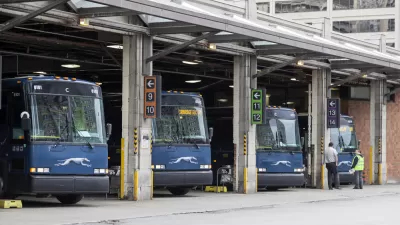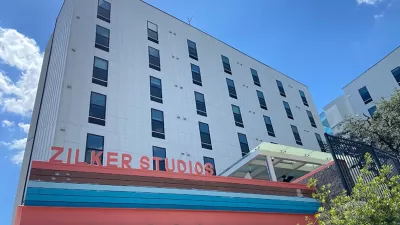A new report shows that low-carbon development policies can help to achieve numerous planning goals including job creation, improved safety and public health, social inclusion, and improved accessibility.

A new report, "The Economic and Social Benefits of Low-Carbon Cities: A Systematic Review of the Evidence," by University of Leeds researchers for the New Climate Economy's Coalition for Urban Transitions, examines the economic case for climate action through more resource-efficient urban planning. This comprehensive review shows that low-carbon measures can help to achieve a range of development priorities, such as job creation, improved safety and public health, social inclusion, and improved accessibility.
Co-benefits include:
- Congestion pricing has been found to reduce traffic, travel times, and congestion 10–30% (Section 2.2).
- Policies which promote liveable density have been shown to increase urban productivity by 3% for every doubling of urban density (Section 2.3.1).
- Public transport networks can reduce transport-related injuries by up to 80% (Section 2.1.5), create direct and indirect employment (Section 2.3.2), and improve public health (Sections 2.2.1, 2.2.2, and 2.1.4).
- Health benefits from dedicated cycle lanes vary from €0.30-1.20 per km (Section 2.1.4).
- Pedestrianisation produces health benefits several times larger than cost of investments (Section 2.1.4).
This evidence suggests that the benefits of these low-carbon measures extend far beyond emission reductions. The wider economic, social, and environmental impacts may be much more valuable than the financial returns associated with climate action. This bundle of measures could therefore provide a platform for more transformative change by building public enthusiasm for low-carbon urban development, as well as the institutional capacities, financing arrangements, and learning needed for more ambitious action.
FULL STORY: The Economic and Social Benefits of Low-Carbon Cities: A Systematic Review of the Evidence

Montreal Mall to Become 6,000 Housing Units
Place Versailles will be transformed into a mixed-use complex over the next 25 years.

Planetizen Federal Action Tracker
A weekly monitor of how Trump’s orders and actions are impacting planners and planning in America.

DARTSpace Platform Streamlines Dallas TOD Application Process
The Dallas transit agency hopes a shorter permitting timeline will boost transit-oriented development around rail stations.

Interactive Map Reveals America's “Shade Deserts”
Launched by UCLA and American Forests to combat heat-related deaths, the tool maps the shade infrastructure for over 360 U.S. cities.

Bicycles and Books — In Sacramento, Libraries Now Offer Both
Adult library card holders can check out e-bikes and e-trikes for up to one week.

Colorado Landfills Emit as Much Pollution as 1M Cars
Landfills are the third-largest source of methane pollution in Colorado, after agriculture and fossil fuel extraction.
Urban Design for Planners 1: Software Tools
This six-course series explores essential urban design concepts using open source software and equips planners with the tools they need to participate fully in the urban design process.
Planning for Universal Design
Learn the tools for implementing Universal Design in planning regulations.
City of Mt Shasta
City of Camden Redevelopment Agency
City of Astoria
Transportation Research & Education Center (TREC) at Portland State University
City of Camden Redevelopment Agency
Municipality of Princeton (NJ)
Regional Transportation Commission of Southern Nevada




























